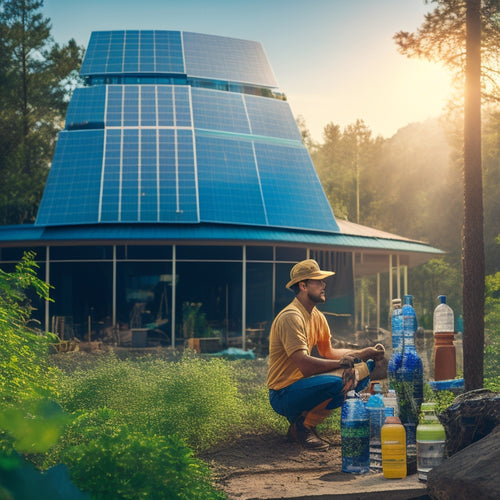
Why Solar Homes Need Water-Efficient Cleaning Tools
Share
As a solar home owner, you're likely committed to reducing your environmental footprint. However, traditional cleaning methods can undermine this effort by wasting precious water resources. Solar panels require regular cleaning to maintain peak energy production, but water-intensive cleaning methods can negate the eco-friendly benefits of going solar. By using water-efficient cleaning tools, you can minimize water consumption, lower energy needed for treatment and transportation, and conserve resources for future generations. By exploring efficient cleaning practices, you'll uncover more ways to enhance your solar home's sustainability and maximize its eco-friendly potential.
Key Takeaways
- Solar homes need water-efficient cleaning tools to conserve water, a crucial resource, especially in water-scarce areas.
- Water-efficient cleaning tools minimize water consumption, reducing energy needed for treatment and transportation, and preserving resources for future generations.
- Cleaning solar panels with water-efficient tools enhances energy efficiency, preventing up to 25% output loss, and supports environmental protection initiatives.
- Implementing rainwater harvesting systems and low-flow cleaning tools in solar homes reduces reliance on municipal water supplies and minimizes overall water footprint.
- Eco-friendly cleaning products and sustainable practices in solar homes lead to lower water bills, reduced energy consumption, and a smaller ecological footprint.
Conserving Water With Solar Power
When you invest in a solar-powered home, you're not only reducing your reliance on fossil fuels but also taking an important step towards conserving water.
Solar power systems require considerably less water compared to traditional power plants, which use water to cool their systems. This reduced water usage contributes to the overall water conservation effort. Furthermore, solar efficiency is directly linked to water conservation, as the energy generated from sunlight reduces the need for water-intensive cooling systems.
By choosing solar power, you're supporting a sustainable future with a lower carbon footprint and reduced water waste. In fact, solar panel installation can provide potential savings of up to 50% on energy bills, which can further contribute to a more environmentally friendly lifestyle.
Additionally, large-scale solar farms can provide a clean and abundant energy source, lessening fossil fuel dependence and promoting sustainability. This collaboration between solar efficiency and water conservation is a fundamental step towards a more environmentally friendly lifestyle.
The Importance of Water Efficiency
Incorporating water-efficient cleaning tools into your solar-powered home reinforces the commitment to conserving this precious resource.
As you work towards sustainable practices, you're likely aware of the looming threat of water scarcity. By using water-efficient cleaning tools, you're taking an essential step towards minimizing your ecological footprint.
Here are three key reasons why water efficiency matters:
-
Reduced water consumption: Water-efficient cleaning tools use considerably less water, which is important in areas where water scarcity is a concern.
-
Lower energy bills: Using less water means you'll also reduce the energy needed to treat and transport it, resulting in lower energy bills.
-
Environmental protection: By conserving water, you're helping to preserve this important resource for future generations and protecting the environment from the impacts of water waste.
Solar Homes and Water Usage
You've made a conscious decision to power your home with solar energy, reducing your reliance on non-renewable resources and minimizing your carbon footprint.
As a solar homeowner, you're likely aware of the importance of regular solar panel maintenance to guarantee ideal energy production, which can be enhanced by a hybrid approach that maximizes energy usage and reduces overall energy costs.
Furthermore, regular cleaning is essential for solar panel performance and energy efficiency, as dirt and debris can reduce energy output by up to 25%.
Cleaning your solar panels is vital, but it requires water. This is where rainwater harvesting comes in – a sustainable way to collect and store rainwater for non-potable uses like cleaning.
By implementing rainwater harvesting systems, you can reduce your reliance on municipal water supplies and minimize your water footprint.
This not only helps the environment but also reduces your water bill.
Cleaning With Limited Water Supply
Since solar panel cleaning is a water-intensive process, adopting water-efficient cleaning tools becomes crucial when working with a limited water supply.
You'll need to optimize your cleaning routine to minimize water waste and guarantee your solar panels operate at maximum efficiency. To achieve this, consider the following water scarcity solutions:
- Reduce water usage: Implement a dry cleaning method or use a water-recycling system to minimize water waste.
Regular cleaning of essential components, such as air filters and radiators, guarantees safety on the road and reduces energy consumption.
- Optimize cleaning schedules: Clean your solar panels during cooler parts of the day or when the panels are partially shaded to reduce water evaporation.
Daily monitoring of energy output tracks consumption patterns and helps pinpoint inefficiencies for optimization.
- Select sustainable cleaning products: Choose eco-friendly cleaning agents that are biodegradable and non-toxic to minimize environmental impact.
Water-Wise Cleaning Product Options
As you maneuver through the market for water-wise cleaning products, look for solutions that not only minimize water waste but also prioritize the health of your solar panels and the environment.
Regular maintenance, including cleaning and inspecting connections, is essential for optimizing performance and ensuring longevity, as regular cleaning of solar panels can prevent up to 20% efficiency loss.
Opt for sustainable supplies that are free from harsh chemicals, ensuring the longevity of your solar panels and promoting a healthier environment.
Eco-friendly solutions, such as biodegradable cleaning agents and microfiber cloths, are effective alternatives to traditional cleaning products.
These options reduce water consumption and minimize waste, aligning with your values of freedom and environmental responsibility.
Benefits of Low-Flow Cleaning Tools
To complement your water-wise cleaning products, incorporating low-flow cleaning tools into your maintenance routine can greatly reduce water consumption.
By making this switch, you'll not only conserve this precious resource but also contribute to a more sustainable cleaning practice.
In addition, adopting renewable energy solutions, such as solar energy implementation, can further minimize your carbon footprint.
This integrated approach can lead to a considerable reduction in energy consumption and greenhouse gas emissions.
-
Reduced water waste: Low-flow tools use considerably less water than traditional cleaning tools, minimizing waste and conserving this important resource.
-
Lower energy consumption: By using less water, you'll also reduce the energy needed to heat and treat water, further decreasing your carbon footprint.
-
Enhanced cleaning sustainability: Low-flow cleaning tools promote a more environmentally friendly cleaning practice, aligning with your commitment to a sustainable lifestyle.
Efficient Cleaning for Sustainable Living
You'll want to focus on three key aspects to achieve efficient cleaning for sustainable living in your solar home: saving water, saving energy, and incorporating eco-friendly cleaning essentials into your daily routine.
By doing so, you'll not only reduce your environmental footprint but also lower your utility bills.
Save Water, Save Energy
Efficient cleaning practices play an essential role in sustainable living, particularly for solar homes where minimizing water and energy consumption is imperative.
As a homeowner, you understand the importance of reducing your ecological footprint. By adopting water-saving technologies and energy-efficient practices, you can greatly decrease your water and energy usage.
Here are 3 ways you can save water and energy while cleaning:
-
Use low-flow cleaning tools: Equip yourself with low-flow cleaning tools, such as water-efficient spray nozzles and mop buckets with built-in water-conserving systems.
-
Implement energy-efficient cleaning schedules: Plan your cleaning tasks during off-peak energy hours to reduce your energy consumption.
-
Opt for eco-friendly cleaning products: Choose eco-friendly cleaning products that require less water and energy to manufacture, reducing your overall carbon footprint.
Eco-Friendly Cleaning Essentials
Switching to eco-friendly cleaning essentials is an essential step in reducing your environmental impact. You can start by replacing traditional cleaning products with biodegradable solutions that are free from harsh chemicals.
These eco-friendly alternatives not only reduce water pollution but also promote sustainable living. When shopping for cleaning tools, look for products made from sustainable materials that can be composted or recycled.
This reduces waste and conserves natural resources. By making these simple changes, you'll be contributing to a cleaner, healthier environment while maintaining the efficiency of your solar home.
Reducing Water Waste in Cleaning
You're likely aware that conserving precious water resources is essential, especially in solar homes where sustainability is key.
When it comes to cleaning, you'll want to minimize wasteful methods that can quickly add up to significant water waste.
Conserving Precious Water Resources
Conserving precious water resources is critical in solar homes, where every drop counts.
As a homeowner, you understand the importance of adopting water scarcity solutions to minimize your environmental footprint.
By implementing sustainable cleaning practices, you can greatly reduce water waste in cleaning. Here are three ways to do so:
-
Use water-efficient cleaning tools: Invest in cleaning equipment that employs minimal water or alternative cleaning agents, such as steam cleaners or microfiber cloths.
-
Optimize cleaning schedules: Prioritize cleaning tasks based on necessity, and reduce the frequency of water-intensive cleaning activities.
-
Choose eco-friendly cleaning products: Select cleaning products that are biodegradable and free of harsh chemicals, reducing the risk of water pollution.
Minimizing Wasteful Cleaning Methods
How much water are you wasting on inefficient cleaning methods? You might be surprised to learn that traditional cleaning tools and techniques are significant contributors to water waste.
It's time to adopt sustainable practices and utilize cleaning innovations to reduce your environmental footprint. Start by reassessing your cleaning routine and identifying areas where water is being squandered.
Consider investing in water-efficient cleaning tools, such as microfiber cloths and steam cleaners, which require minimal water usage. By making these changes, you'll not only conserve precious water resources but also reduce your energy consumption and lower your utility bills.
Efficient Rinsing Techniques Matter
Every gallon counts when it comes to water conservation, and efficient rinsing techniques can make a noteworthy impact.
As a homeowner, you can optimize your rinse efficiency by adopting spray techniques that minimize water waste.
Here are three effective techniques to reflect upon:
-
Pulse spraying: This technique involves releasing water in short, controlled bursts, reducing overall water usage while still effectively rinsing surfaces.
-
Wide-angle spraying: Using a wide-angle spray nozzle allows you to cover larger areas with less water, reducing waste and promoting rinse efficiency.
-
Low-flow spraying: Installing low-flow spray nozzles can notably reduce water consumption, making it an ideal solution for water-conscious homeowners.
Eco-Friendly Cleaning for Solar Homes
Many solar homeowners are adopting eco-friendly cleaning practices to minimize their environmental footprint. You can join them by making conscious choices in your cleaning habits.
Switch to sustainable products that promote green cleaning, which aligns with your solar maintenance goals. When shopping, look for eco-friendly certifications to guarantee the products you choose support energy efficiency and water conservation.
By adopting these practices, you're not only reducing your reliance on non-renewable resources but also contributing to home sustainability. Stay updated on cleaning innovations that can further optimize your solar maintenance routine.
With these simple changes, you'll be taking a significant step towards a more environmentally friendly and sustainable living space.
Frequently Asked Questions
Can I Use Rainwater for Cleaning My Solar Home's Exterior?
You can use rainwater for cleaning your solar home's exterior, leveraging rainwater benefits like reduced water waste and lower energy bills. This approach supports efficient solar panel maintenance, ensuring ideal energy production while promoting eco-friendly practices.
Are Water-Efficient Cleaning Tools More Expensive Than Traditional Ones?
As you scrutinize scrubbers, you'll find that silky-smooth water-efficient cleaning tools might seem steep upfront, but a cost comparison reveals long-term savings, freeing your wallet from wasteful water bills, and your conscience from environmental guilt.
How Do I Measure the Water Flow Rate of My Cleaning Tools?
You'll measure the water flow rate of your cleaning tools by using flow measurement techniques, such as a flow meter or a bucket and stopwatch, to calculate the volume of water used per minute, ensuring peak cleaning tool efficiency.
Can I Reuse Water for Cleaning in My Solar Home?
You're likely aware that 80% of the world's wastewater is released into the environment without adequate treatment, so it's great you're considering water reuse! Yes, you can reuse water for cleaning in your solar home by implementing water recycling and eco-friendly solutions that minimize waste and reduce your environmental footprint.
Do Water-Efficient Cleaning Tools Clean as Effectively as Traditional Tools?
You'll find that water-efficient cleaning tools, like microfiber cloths and low-flow nozzles, clean just as effectively as traditional tools, offering eco-friendly alternatives that prioritize cleaning effectiveness without sacrificing the planet's precious resources.
Related Posts
-

What Tax Deductions Apply to Sustainable Building Materials?
You can claim various tax deductions for sustainable building materials, thanks to over 40 federal tax incentives sup...
-

3 Best Solar-Powered Biodegradable Accessories for Your Home
You're taking a significant step towards a more sustainable lifestyle by incorporating solar-powered biodegradable ac...
-

7 Top HEPA Filters for Green Building Projects
You need a reliable HEPA filter for your green building project that aligns with your sustainable goals and guarantee...


